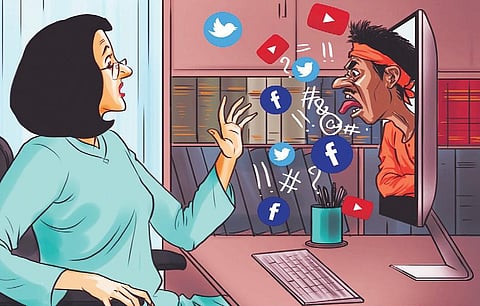

What company we keep! These social media pyjamas that we wear day in and day out, now more so because of the coronavirus stalemate, have made a travesty of our lives. Rumour mills, troll armies, mountebankery—where to begin? Think of their user base, they can give the top rankers in the world population stakes a good scramble for their yuans. They indeed are nations of sorts with legions of dedicated subjects just as countries have. Do they behave as governments at least pretend to, if not can we measure them against yardsticks of good behaviour?
Though democracy has been falling out of fashion because it’s so last season and the fashion gurus of the planet are trying out new designs on us, we still harbour faint democratic expectations from the captains of social media, who founded empires on the internet. More so because, unlike early explorers, they profess to ‘empower’, help ‘build community’ and be a ‘force for the good’. Just look at the information sections of their websites and you get drenched in a waterfall of good intentions. ‘Free expression’, ‘civil liberties’; it would seem we are back in undergraduate political science class.
How does this translate on the ground? From being sewer pipes of outrage, to providing havens for digital lynch mobs and covert operators who love to tweak elections over shots of fiery spirits, these transcontinental zamindaris riding their algorithmic horses are trampling the very principles of fellowship and community they advertise. How unfair! We paid our taxes by depositing our personal data and behavioural profiles to the care of their advertisers and they give potholed roads of belligerent opinion, post-truth and a bunch of quid pro quo ‘likes’ in return. Which electorate would tolerate this?
When Hobbes and others were laying down the justifications for the social contract, it was rightfully argued that this will prevent the bellum omnium contra omnes—the war of all against all. But dressed in the colourful pyjamas of these online empires we find we are drawn into infinite battles and being subject to whiplashes of outrage, attacks and illiberalism, all of which defenestrate the concept of empowerment with the deftness of a flame-thrower.
Democracy Reporting International (DRI), an organisation which plays spoilsport by devising certain measures, cites a 2018 survey which found that nearly two-thirds of women journalists have been harassed or threatened online. Women activists and politicians are not exempt from the demons that hide in the folds of socmed’s soiled pyjamas. The same DRI report quotes another source which says close to 42 percent female parliamentarians ‘experienced extremely humiliating or sexually charged images of themselves spread on social media’.
Did any of us try one of those snake oil remedies for eliminating the novel coronavirus that were being furiously shared on Facebook in the early days of the attack? Hope we didn’t but an innocent soul I know almost fried up his tongue by trying to send a jet of superhot air down his oral cavity in search of the furtive virus. Health is an area where Facebook or YouTube communities can play a useful role but their record has often been dubious. Fernández-Luque and Teresa Bau characterising health on social media as a ‘perfect storm of information’ point out how among many other things, hordes of pro-anorexia activists on these websites defend this disease as a matter of lifestyle. Examples can be multiplied.
On the count of digital democracy alone these populous dominions of participative internet look increasingly like the dacoit-infested valleys of an earlier Chambal rather than the safe and egalitarian online societies that their creators, in their overflowing benevolence, might have envisaged for us. The sheer volume of negative reports about the dismal circus on digital platforms make it clear that the much vaunted flagging and content moderation is not delivering. Dr Anurag Mishra, founder of Psychoanalysis India, likens this phenomenon to the occasional failure of the inbuilt editing mechanism of our cells that checks for copying errors, consequently triggering cancer.
This does look like cancer! Which brings us back to the need to develop independent yardsticks of performance for these behemoths. The United Nations system has for long been ranking countries on scales of health, education, gender empowerment and other factors, aggregated to create indices like the ‘human development index’. It is time to bring the digital superstates of social media under the lens of new composite indices which would assess their performance on several desirable values. Once we know how they fair, we can decide whether to remain or seek sanyas.
rajat@rajatchaudhuri.net
Writer and climate activist